#cincinnati rail splitter
Explore tagged Tumblr posts
Text
The Partisan Press — Republican Campaign Newspapers in the 1860 Election
The 1860 presidential campaign, which pitted Republican Abraham Lincoln against Southern Democrat John C. Breckinridge, Northern Democrat Stephen A. Douglas, and Constitutional Unionist John Bell, was a brief affair by 21st-century standards. The campaign began after the party conventions in May and June and ended with the election on November 6th. The candidates did not campaign for themselves—with the tradition-breaking exception of Douglas’s “visits to his mother”—so it was up to the candidates’ supporters to bring their man to the voters’ attention and whip up the enthusiasm that would produce success at the polls. Lincoln’s supporters got to work, producing biographies of the candidate; political cartoons; campaign flags, tokens, and buttons; and songs to be sung at rallies.
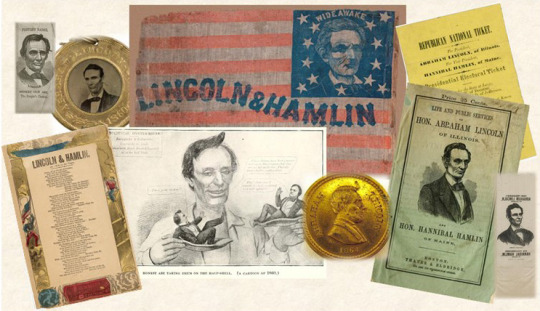
And they published campaign newspapers—entirely partisan weeklies that supported the Republican Party and lauded its candidate while criticizing and sometimes demeaning the opposition. The Chicago Rail Splitter is a prime example. The paper made its debut on June 23, 1860, and published 18 regular issues, ending on October 27th.

In addition, it published a special “pictorial” issue on September 30th that featured a series of cartoons lampooning Democrat Stephen Douglas.
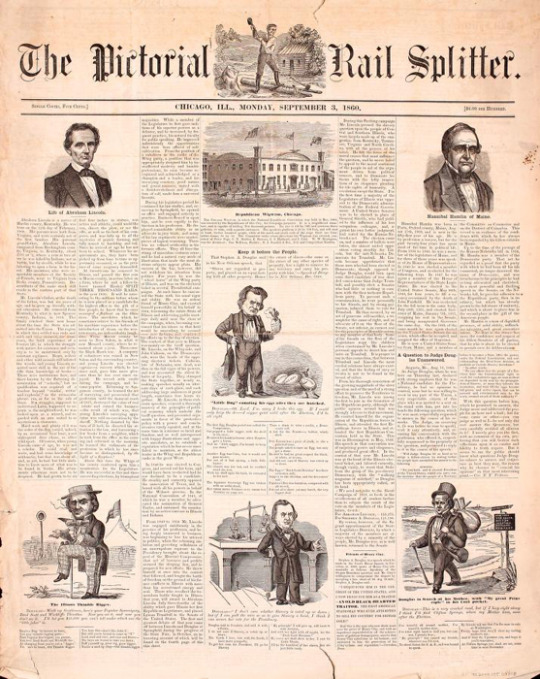
The paper’s editor, Charles Leib, was a man with a somewhat shifting (or shifty) political history, but with his appointment as editor of the Rail Splitter, he became a vociferous Republican partisan. An advertisement for the paper promised to “handle the Split Tail Democracy without Gloves.”
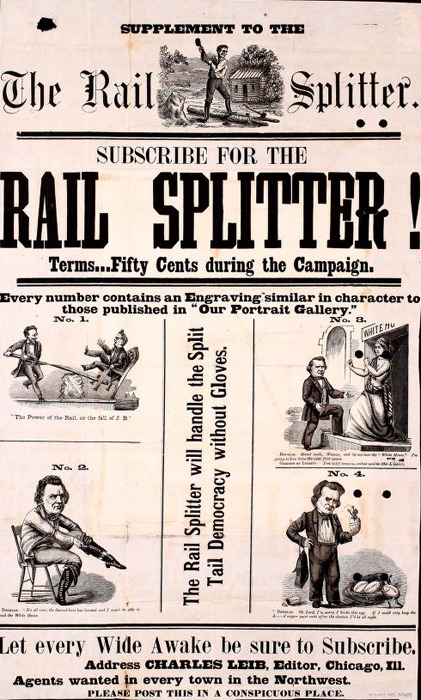
And in his introduction to the first issue, Leib promised to “earnestly advocate the principles of Republicanism because they are founded in right” and to “expose the double-dealing…and…villainous schemes” of the Democrats. “There will,” he proclaimed, “be a great deal of crimination and recrimination.” And he concluded somewhat pugnaciously, “if we should incur the displeasure of any of the Democracy [Democratic Party] for telling the truth, and they should feel aggrieved, they can call at our office, at 66 Randolph Street, up stairs, where we will be most happy to give them any satisfaction they may desire. We will not, however, take back any statement we make, of the truth of which we are satisfied.”

The Republicans of Cincinnati also published a Rail Splitter, independent of the Chicago paper. The Cincinnati paper published every Wednesday from August 1st through October 17th, with a final issue on October 27th, under the editorship of J.H Jordan and J.B. McKeehan.
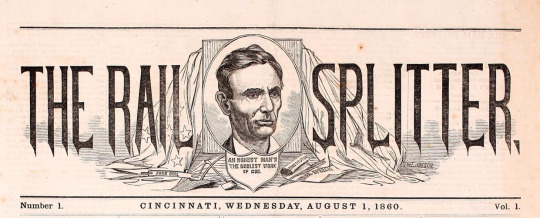
The Cincinnati Rail Splitter advertised itself as “devoted to facts, arguments, and incidents, which will be of great service to the Republican cause throughout the United States” in order to “take the ‘starch’ out of the ‘Little Giant’ and other Democratic ‘Dough Faces,’ and show them up in their true colors.” In fulfilling that goal, the paper would “stir up the young men of the country to activity and vigilance, and light up the watch-fires of ‘LINCOLN and HAMLIN’ on every hill.”
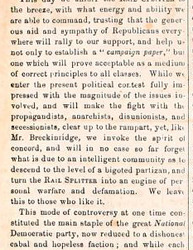
Unlike the Chicago and Cincinnati campaign papers, each of which cost 50 cents per issue, the Wide-Awake and Central Campaign Club Bulletin was distributed in New York City for free.

New York City was home to numerous Wide-Awake clubs—groups of young men who supported Lincoln and the Republicans with well-organized torch-light parades featuring marching units dressed in helmets or caps and shiny caped uniforms made of enameled cloth. Parades usually ended with nighttime rallies. The clubs also sponsored indoor meetings with well-known speakers. The October 5th issue of the Wide-Awake and Central Campaign Club Bulletin details a meeting held at the Cooper Union where Thaddeus Stevens was the primary speaker.
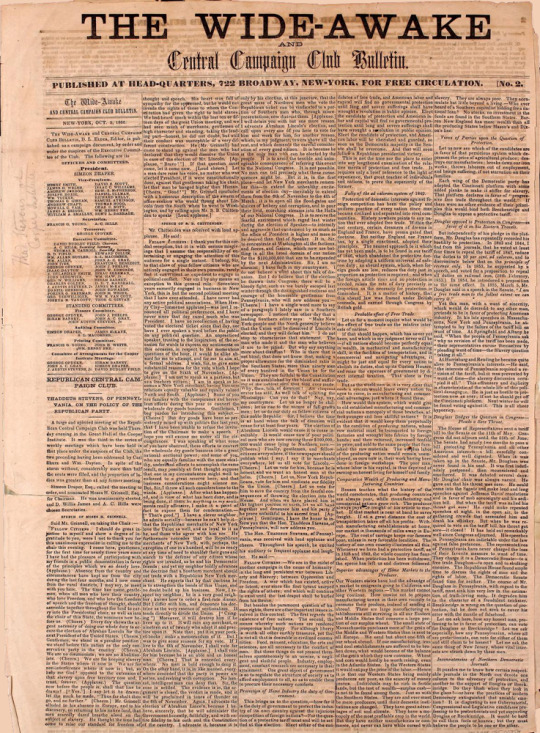
It also includes advertisements for Wide-Awake supplies like torches, “oils for torch lights and signal lanterns,” and printed membership certificates.
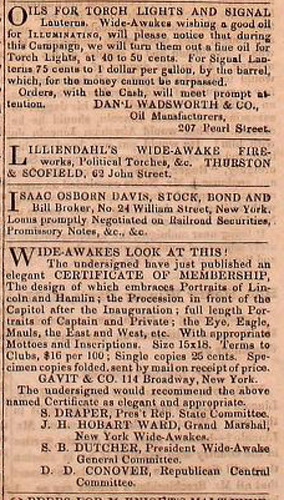
While the Wide-Awake Clubs were new organizations formed for the 1860 election, the Young Men’s Republican Union of the City of New York was a more experienced group, having been formed in 1856 to support Republican candidate John C. Frémont. The Union sponsored a reading room and met regularly to hear speakers—it was, in fact, the sponsor for Abraham Lincoln’s speech at Cooper Union on February 27, 1860. The Union published a series of tracts or campaign papers between June 19th and October 2nd titled “Lincoln and Liberty!!!” The papers published excerpts from speeches and newspapers and reported on the campaign’s progress across the North.
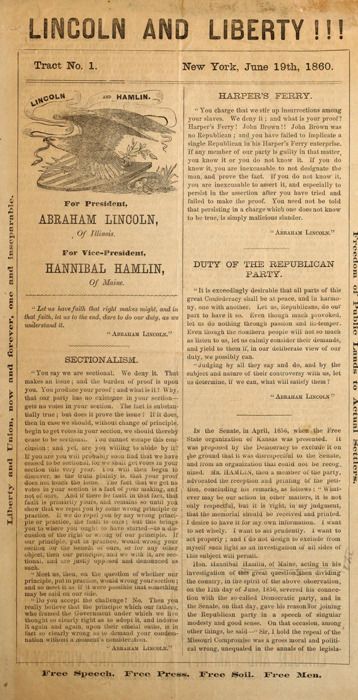
The Union was, however, a self-proclaimed young men’s movement and formed its own Wide-Awake unit, the Rail-Splitter’s Battalion.
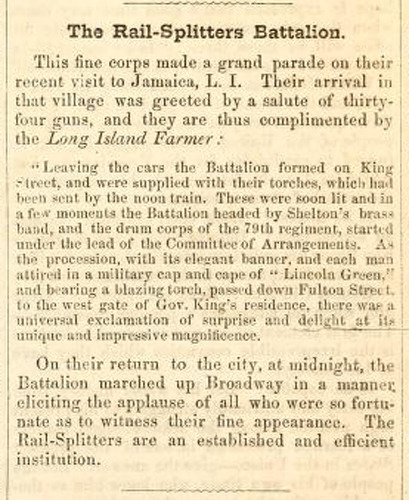
In Tract No. 2, the Union proclaimed that “Young Men are rallying, in great numbers and with unbounded enthusiasm, to the support of ‘Honest Old Abe’…the Young Men have every confidence in the Illinois rail-splitter, knowing that one competent to raise himself from the humblest and most obscure, to the most elevated and influential position in society, is fit to be entrusted with the reins of government, and will not hold them amiss. Lincoln is, emphatically, the choice of the Young Men, and their earnest enthusiasm will contribute largely to his inevitable success.”
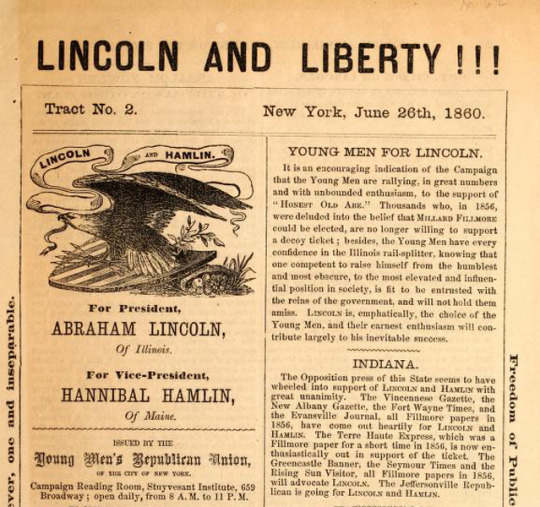
Whether Lincoln’s success in 1860 was inevitable was an open question, of course, but the Republican campaign papers did their best to make it so.
#abraham lincoln#abrahamlincoln#1860 election#campaign newspapers#newspapers#chicago rail splitter#cincinnati rail splitter#young men's republican union#wide-awakes
13 notes
·
View notes